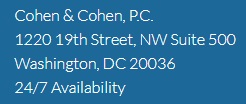Some people think car insurance is to compensate someone you’ve injured, either because it’s the right thing to do when you injure someone; or so you don’t have your house taken or wages garnished for the rest of your life. Some people think car insurance is to protect you and your loved ones. In fact, it’s both.
Will your car insurance protect you and your loved ones in the event of a crash? The answer to this question may be the difference between an inconvenience and a financial catastrophe. Do you know the minimum insurance you have to have to drive lawfully in Virginia? Would you believe zero? That’s right. You can lawfully drive uninsured in Virginia. The lawful minimums in D.C. and Maryland are not that much better when it comes to serious injury, as a personal injury lawyer Chevy Chase MD trusts can explain. How many cars on the road do you think are uninsured? Imagine this. You are injured by the negligence of an uninsured driver, who has an ’87 Buick and flips burgers for a living. If you haven’t taken the right steps to protect yourself, you’re in for some serious financial trouble. Even if you have health insurance, there are deductibles, and copayments. Health insurance won’t cover lost wages, property damage or permanent injury.
The good news is there is a way to protect yourself against this situation. It’s called uninsured/underinsured coverage. You probably have this right now. If you look on the declaration sheet of your car insurance, you should see something like “uninsured”. Note it has the same limits as your public liability. If you have 30/60/15 in liability coverage, you are insured to that extent against the situation where the at-fault driver has insufficient insurance to compensate you for your loss. The hooker is that, as of now, the uninsured coverage is subject to a credit of the other driver’s insurance. That means if you have 30/60 and the other driver has 30/60, you have no uninsured coverage. Maryland has recently enacted legislation for crashes after July 1, 2017, that does away with this. So, in the above scenario, you would be entitled to the other driver’s 30 plus your 30. In other words, you would get the insurance coverage you paid for.
Some people are balancing meds, mortgage, student debt, food and other things. These people will of necessity buy the cheapest coverage they can get. If you have discretionary income, you should look at your carrier’s website and check out how much it costs to increase your coverage. I think you’ll be pleasantly surprised at the cost of increasing your liability (and remember your UM/UIM) coverage to 100/300, the minimum I advise my clients. Ignorance is bliss if you never have to call on inadequate insurance. If you have the bad luck to have a significant crash, you’ll be glad you increased your coverage and spent that extra money.
 Thanks to our friends and contributors from Thyden, Gross and Callahan LLP for their insight into insurance coverage and car accident cases.
Thanks to our friends and contributors from Thyden, Gross and Callahan LLP for their insight into insurance coverage and car accident cases.

